Inside Clover, a plant nursery tucked into Milwaukee’s Bay View neighborhood, a sticker displayed at the front desk captures the essence of the shop with a simple yet telling slogan: “More than a plant shop.” This modest phrase hints at the deeper mission of Clover — a place where plants, community and sustainability thrive together.
The cozy space is draped in jungle-like greenery and feels alive amid its dusty orange and golden-yellow walls. Plants of every shape and size — from short succulents to cascading vines and large leafy trees — cultivate a perfect blend of natural chaos and comfort, encouraging people to step inside and stay a while.
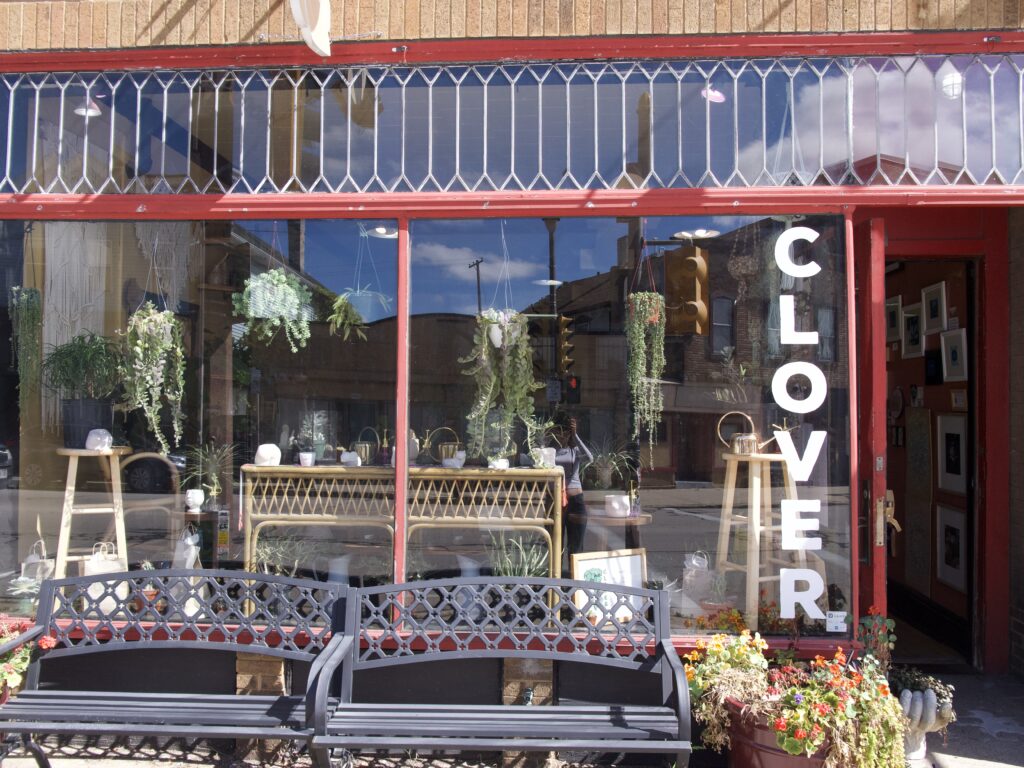
Originally starting as a simple way to make ends meet after losing work during the pandemic, Clover has since grown into a thriving, community-focused business. Co-founders Maggie Murphy and Sissy Butner not only established a sustainable company, but also built a space dedicated to uplifting their Bay View neighborhood, inspiring both entrepreneurs and plant lovers alike. At Clover, eco-conscious practices are paramount, embodying a commitment to fostering community through sustainable living.
“We wanted to be as inclusive as possible and just make it feel really comfortable for anybody walking through the door,” Murphy says. “No matter what your age, whatever your beliefs are, whatever you’re feeling, just come in, take a breath of fresh air.”
Murphy and Butner launched Clover in the midst of the pandemic, when many people were suddenly stuck at home and craving more life sources in their living spaces.
“So many people went from working at offices or having a job to commute to, to working at home,” Murphy says. “They realized that their home is sterile — they might not have a lot of plant life, decoration or stuff that they hadn’t thought of before.”
Simon Gilroy, a UW–Madison professor of botany, says humans are happier beings when they are surrounded by plants. During the pandemic, there was a significant increase in demand for greenery, as the lack of outdoor interactions became notably apparent.
“When it’s things like isolation, plants become really important,” Gilroy says. “It’s the emotional support. And it’s not the emotional support that you get from a pet or something like that. It’s the support of a biological living world around you, which a lot of times, nowadays we can end up isolating ourselves from.”
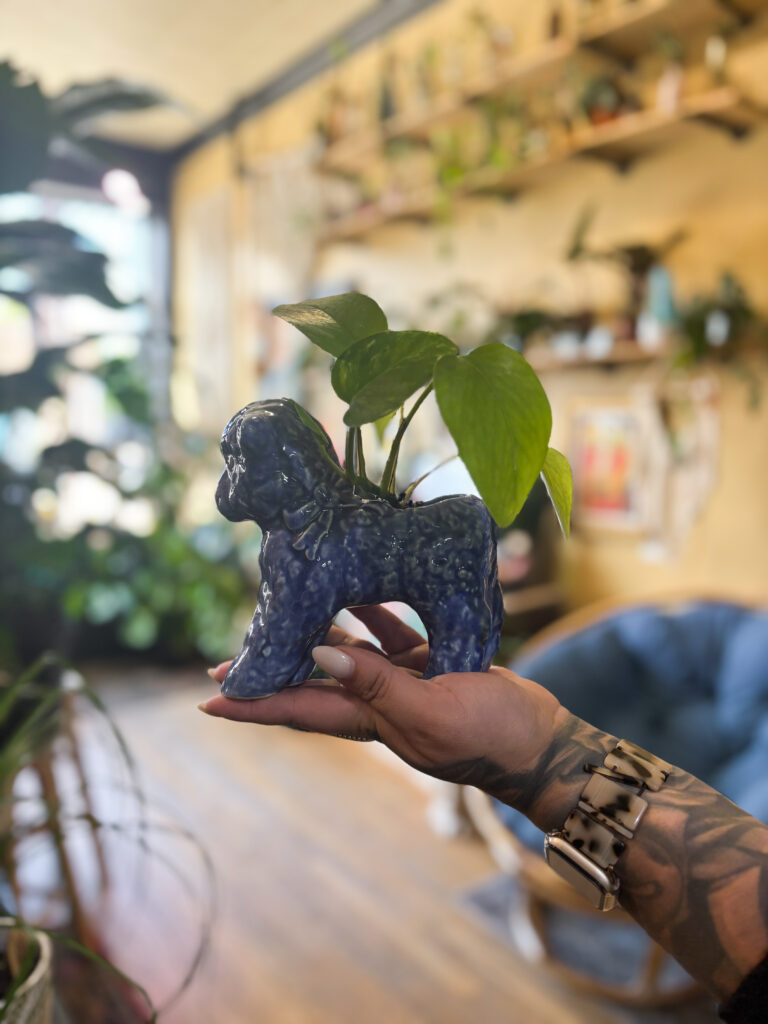
Photo by Noa Chamberlin.
As a business, Clover recognizes the impact plants have on humans and makes a conscious effort to weave sustainability efforts into everything it does. For Murphy, sustainability is personal, deeply rooted in her upbringing.
She remembers a world before everything became “plasticky,” as she puts it, a time when there was an abundance of greenery.
“I’m always thinking about how is this going to affect the environment, people around me, animals around me, the nature,” Murphy says. “What are we doing, and how can I make the business reflect on that?”
These ideals are ingrained in Clover’s commitment to incorporating sustainability efforts into its business model.
For instance, instead of shipping plants from distant locations, Murphy and Butner make a conscious decision to supply all their plants locally from Wisconsin or just across the border in Illinois.
“When we first opened, we decided that we were only going to source plants out of the Midwest instead of risking having plants shipped in from California, Florida, anything like that,” Murphy says. “So that keeps it nice and local.”
Sourcing locally grown plants not only reduces Clover’s environmental footprint, but it also allows the owners to add their personal touch. Murphy and Butner visit the greenhouses where the plants are grown, allowing them to handpick the highest-quality plants for their shop.
“ The more little places that we pop up around the community, the more we’re seeing different people from different walks of life come into the shop for the first time, still after three and a half years of being open, which I think is really, really cool . “
Clover’s local approach hasn’t limited its selection. In fact, customers like Nickolas Robinson are constantly discovering new and interesting plants.
“I’ve been able to find so many different kinds of plants. I’ve been able to go into so many different directions of plants that I didn’t think I would go for,” Robinson says. “You just discover new things all the time in there and it’s just, it’s so wonderful. They really create a fantastic atmosphere.”
The “fantastic atmosphere” Robinson describes goes beyond the plants that brighten the space — it’s also shaped by the beautiful decor that adorns the walls. Clover proudly showcases local female artists on its gallery wall, a significant attraction for customers. Currently featuring 23 artists, the gallery underscores Murphy and Butner’s dedication to supporting women and fellow entrepreneurs within their community.
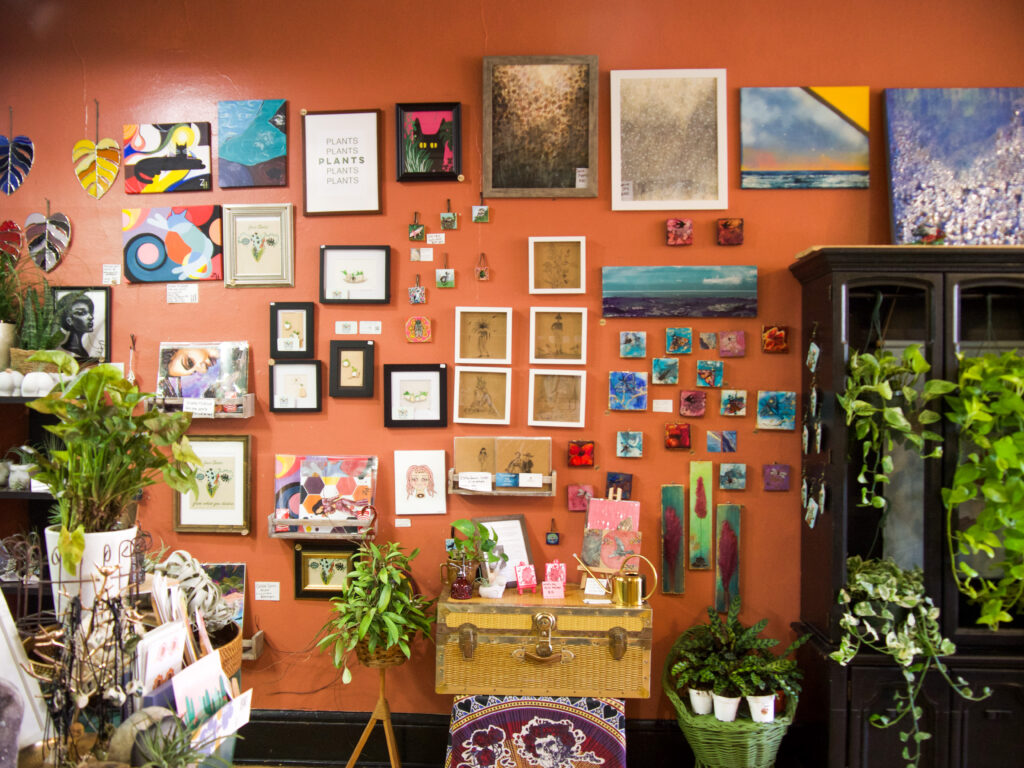
The atmosphere Murphy and Butner have cultivated is not only aesthetically pleasing, but also built with sustainability in mind.
Rather than buying new vessels for their plants, the two often scour estate sales for containers that can be repurposed into unique plant pots. Sometimes they find old planters, but other times, they get creative with items like teapots, pitchers or even old decor.
“It’s really fun to go to these estate sales or thrifting or wherever you are and look for pots or even vessels that wouldn’t necessarily be a plant pot,” Murphy says. “Just repurposing weird things that shouldn’t be planters, and then we’ll make them a planter.”
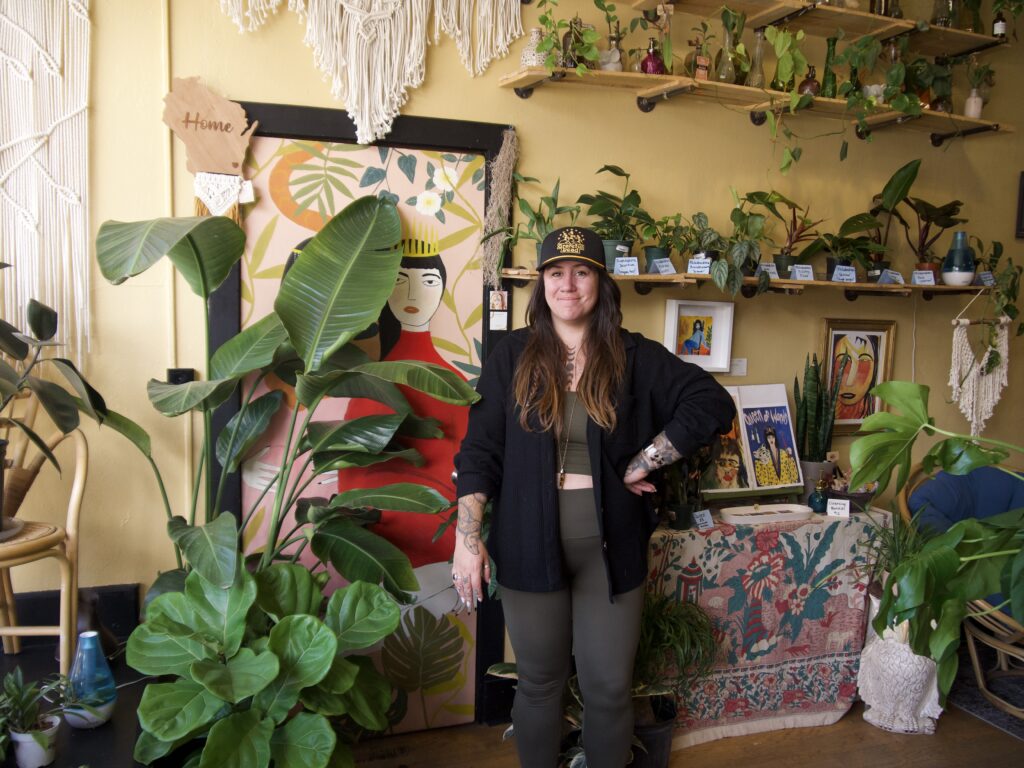
This innovative reuse of materials adds to the individuality and charm of Clover, making each plant purchase feel one-of-a-kind.
“They repurpose some things from the ’70s, and it’s fun and quirky,” Robinson says. “I absolutely love that.”
Clover’s sustainable efforts don’t stop at eclectic plant vessels. The business also partners with Compost Crusaders, a Milwaukee-based organization dedicated to diverting organic material from landfills.
Though Clover doesn’t produce food scraps, it donates plant remnants and other materials to be repurposed, ensuring nothing goes to waste.
“ I feel like we could do so much and really continue on our mission to be sustainable in a practical way while also providing a place for people to just feel a good energy . “
“I’m always thinking of different ways to make sure that everything is as sustainable, reusable and plentiful as possible,” Murphy says.
Ann Terlaak, an associate professor in the UW–Madison School of Business with a focus on organizational adaptation and learning in corporate sustainability and environmental management, says community engagement is just as crucial for small businesses as sustainability. She emphasizes that small businesses, like Clover, offer more than just products — they become integral to the quality of life in their neighborhoods.
“I don’t know that this is understood by everyone in the community,” Terlaak says. “I think if businesses can communicate to the community, in some ways to clarify for the community, the value that they are actually bringing, that is helpful to then garner the support.”
Since opening in February 2021, Clover’s appeal has extended beyond simply offering plants to brighten homes. The store has become a gathering place for plant enthusiasts, fostering connections within the community.
“In the store, you can do the Wisconsin small talk thing and you can do that with plants. It’s fun and you just meet new people,” Robinson says.
Being surrounded by plants has also been proven to increase an individual’s mood and overall well-being, according to Gilroy.
“Just having them around, it lifts your mood. When people get depressed during the winter, house plants are a counteracting force that you have a living world around you,” Gilroy says. “It has a psychological impact, which is quite profound.”
Murphy has noticed these benefits from her own life and that of her customers.
“You’re increasing the oxygen in that area, you’re having a healthy routine,” Murphy says. “Just having something with a sense of not urgency, but like it has a sense of responsibility a little bit. It helps you feel a little more confident with yourself. Like, oh, look at me, this plant is growing now because I’ve been taking care of it.”
Caring for plants fosters a forward-thinking mindset, encouraging us to seek growth and recognize future possibilities.
“Thinking into the future is something that a lot of times people lose track of and get so caught up in all of the problems of the present day,” Gilroy says. “And the plant biology makes you have to look forward.”
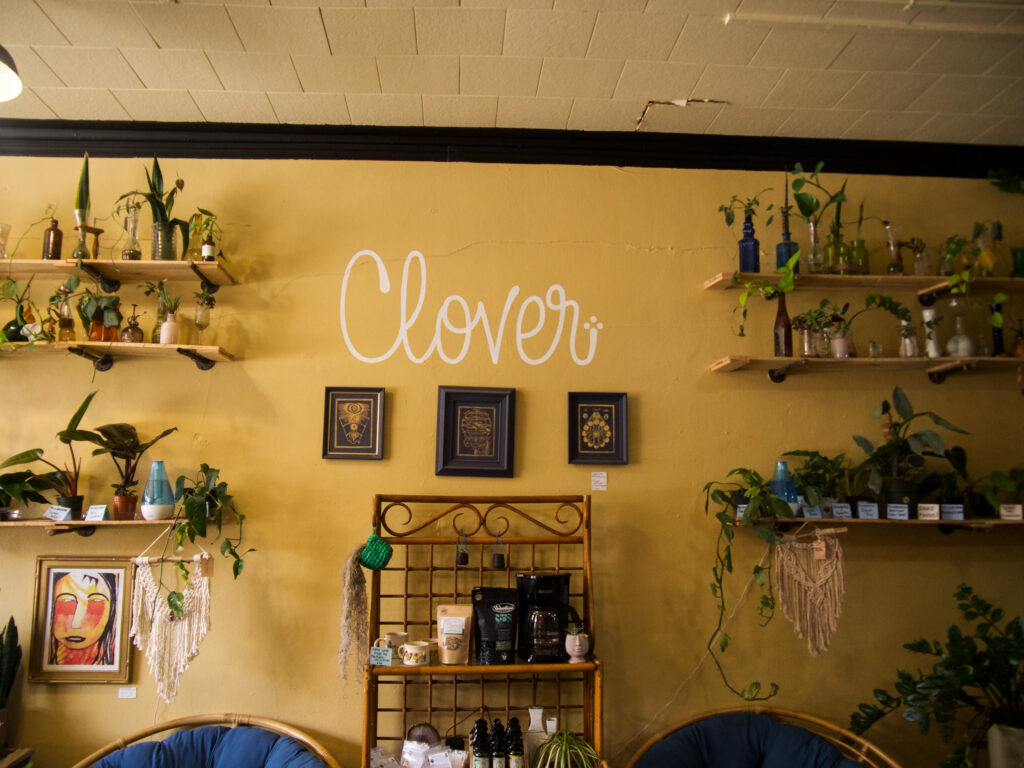
To continue engaging with the Bay View community and growing as a business, Clover participates in pop-up markets, plant-paint nights and community yoga classes.
“The more little places that we pop up around the community, the more we’re seeing different people from different walks of life come into the shop for the first time, still after three and a half years of being open, which I think is really, really cool,” Murphy says.
As Clover continues to build on its mission of sustainability and community, Murphy remains hopeful about the future.
“I feel like we could do so much and really continue on our mission to be sustainable in a practical way while also providing a place for people to just feel a good energy,” Murphy says.
Their slogan stands true. Clover truly is more than a plant shop.
Cover photo and tile photo: The view upon entering Clover reveals a lively shop filled with plants of all sizes, bringing vibrant color and energy to the space. Photo by Noa Chamberlin.
Published on Dec. 9, 2024